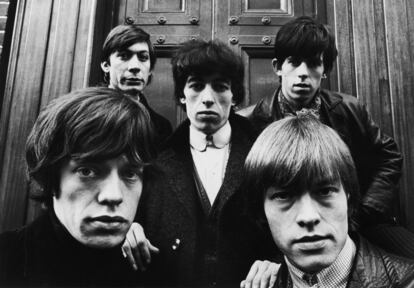Brian Jones: the infernal angel of the Rolling Stones
The great showoff of British pop was expelled from the band by his friends

For some, musician Brian Jones embodies the original sin of the Rolling Stones, exemplifying the cruelty that has allowed the band to hang in there for 60 years. For others, he was the prototype of the badass rock star — a burden they did well to get rid of.
It’s worth remembering that Jones (1942-1969) was the leader and driving force of the band during its early days. In fact, management secretly paid him an extra amount. When this became known, the other members were outraged. He could have claimed that he used those funds to support the children he had with different girlfriends… but in truth, he ignored his offspring. Certainly, he didn’t serve as an ethical model. Many assume that he mistreated the actress Anita Pallenberg, who ended up taking refuge in the arms of the other guitarist, Keith Richards.
Brian Jones was a walking danger. He once thought it would be fun to have his photo taken in an SS uniform. Recklessly, he bragged to strangers about his taste for drugs, opening the door to police harassment against the Stones. In a case of massive hypocrisy, one of the reasons that his bandmates invoked to kick him out of the group was that his transgressions made it difficult to obtain the necessary visas to tour the United States. However, Richards’ subsequent — and much more extensive — police record never prevented the band from performing in that country.

The fact of the matter is that Jones was simply the victim of a sordid power struggle within the Stones, which was ultimately won by Richards and Mick Jagger. At the same time — and perhaps they weren’t aware of it — they lost a great musical asset. During his short life, Brian expanded the group’s sound palette with his ability to incorporate instruments that were unusual in Western music at the time, such as the sitar, the psaltery, the mellotron and the autoharp. The pop phase that the Stones went through — which is often forgotten — was, in large part, the work of Brian Jones.
Of course, there are prodigious musicians who, in the end, lack the motivation, imagination and energy necessary to develop their own initiatives. The only album with his name on the cover is Brian Jones Presents the Pipes of Pan at Joujouka: wild field recordings (later manipulated in-studio) made in the Rif Mountains of Morocco, in collaboration with North African musicians. The soundtrack he made for A Degree of Murder (1967) — Oscar-winning German director Volker Schlöndorff’s second feature film, starring his beloved Anita — was never legally available, until now. You can listen to it on YouTube.
There’s a divergence of opinions regarding that soundtrack. The German director — not at all impressed by the fact that he had called on heavyweights such as Jimmy Page or Nicky Hopkins, who declined — had a negative opinion of Jones’ way of working. However, session engineer Glyn Johns — who isn’t always kind to the musicians he produces — was supportive of Jones’ inventiveness.
The outcome of Brian Jones’ drift is well-known. Officially fired from the Rolling Stones on June 8, 1969, he drowned in his swimming pool on the night of July 2. He’s credited with founding the 27 Club, an informal list consisting mostly of popular artists who died at age 27.
But Anita Pallenberg never believed in curses or divine punishments: “He was surrounded by people who didn’t know what to do with an asthmatic who had gone too far with drugs.”
Sign up for our weekly newsletter to get more English-language news coverage from EL PAÍS USA Edition
Tu suscripción se está usando en otro dispositivo
¿Quieres añadir otro usuario a tu suscripción?
Si continúas leyendo en este dispositivo, no se podrá leer en el otro.
FlechaTu suscripción se está usando en otro dispositivo y solo puedes acceder a EL PAÍS desde un dispositivo a la vez.
Si quieres compartir tu cuenta, cambia tu suscripción a la modalidad Premium, así podrás añadir otro usuario. Cada uno accederá con su propia cuenta de email, lo que os permitirá personalizar vuestra experiencia en EL PAÍS.
¿Tienes una suscripción de empresa? Accede aquí para contratar más cuentas.
En el caso de no saber quién está usando tu cuenta, te recomendamos cambiar tu contraseña aquí.
Si decides continuar compartiendo tu cuenta, este mensaje se mostrará en tu dispositivo y en el de la otra persona que está usando tu cuenta de forma indefinida, afectando a tu experiencia de lectura. Puedes consultar aquí los términos y condiciones de la suscripción digital.









































